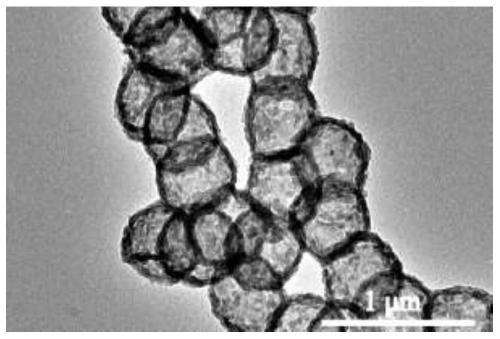A chiral organometallic skeleton hollow nanosphere and its preparation method and application
An organometallic, hollow nanotechnology, applied in organic chemistry methods, preparation of organic compounds, organic chemistry, etc., can solve the problems of high-efficiency adsorption and separation of racemic amino acids, such as the lack of technical literature and data, and achieve excellent separation effect and separation. Outstanding performance, simple to handle effects
- Summary
- Abstract
- Description
- Claims
- Application Information
AI Technical Summary
Problems solved by technology
Method used
Image
Examples
Embodiment 1
[0047] Example 1. Preparation of Chiral Organometallic Framework Hollow Nanospheres
[0048] The composition of raw materials is as follows:
[0049] 45 parts of styrene
[0050] 3 parts methyl methacrylate
[0051] 2 parts acrylic
[0053] 22 parts of 2-methylimidazole
[0054] D-histidine 3 parts.
[0055] The preparation method is as follows:
[0056] 1. Add 3 parts by mass of methyl methacrylate and 2 parts by mass of acrylic acid to 45 parts by mass of styrene, and react at 80°C for 12 hours under nitrogen protection, using 0.1 part by mass of ammonium persulfate as an initiator. After the reaction was completed, it was centrifuged and freeze-dried for later use.
[0057]2. Dissolve 25 parts by mass of zinc nitrate, 22 parts by mass of 2-methylimidazole, and 3 parts by mass of D-histidine in an appropriate amount of distilled water, and then add the carboxylated polystyrene microspheres obtained in step 1. After hydrothermal reaction...
Embodiment 2
[0065] Example 2. Preparation of Chiral Organometallic Framework Hollow Nanospheres
[0066] The composition of raw materials is as follows:
[0067] 43 parts of styrene
[0068] 4 parts methyl methacrylate
[0069] 2 parts acrylic
[0070] Zinc nitrate 26 parts
[0071] 22 parts of 2-methylimidazole
[0072] D-histidine 3 parts.
[0073] The preparation method is as follows:
[0074] The preparation method that the present invention applies:
[0075] 1. Add 4 parts by weight of methyl methacrylate and 2 parts by weight of acrylic acid to 43 parts by weight of styrene, and react at 80° C. for 12 hours under nitrogen protection, using 0.1 parts by weight of ammonium persulfate as an initiator. After the reaction was completed, it was centrifuged and freeze-dried for later use.
[0076] 2. Dissolve 26 parts by weight of zinc nitrate, 22 parts by weight of 2-methylimidazole, and 3 parts by weight of D-histidine in an appropriate amount of distilled water, and then add the...
PUM
 Login to View More
Login to View More Abstract
Description
Claims
Application Information
 Login to View More
Login to View More - R&D
- Intellectual Property
- Life Sciences
- Materials
- Tech Scout
- Unparalleled Data Quality
- Higher Quality Content
- 60% Fewer Hallucinations
Browse by: Latest US Patents, China's latest patents, Technical Efficacy Thesaurus, Application Domain, Technology Topic, Popular Technical Reports.
© 2025 PatSnap. All rights reserved.Legal|Privacy policy|Modern Slavery Act Transparency Statement|Sitemap|About US| Contact US: help@patsnap.com



